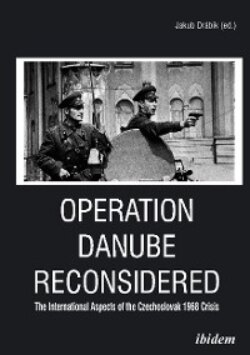Описание книги
The volume’s contributors are: Ljubodarg Dimić, Jakub Drábik, Mihail Gruev, Slavomír Michálek, Miklós Mitrovits, Jackques Rupnik, Alexander Stykalin, Mirosław Szumiło, Michal Štefanský, and Virgiliu Tarau

Реклама. ООО «ЛитРес», ИНН: 7719571260.
Preface
01. Introduction
02. Reflections on 1968 and its Legacies
03. The Prague Spring and the Evolution of the Position of Leonid Brezhnev
04. Limits of Washington’s Position Towards the Invasion of Czechoslovakia in the Summer of 1968
05. Yugoslavia and Czechoslovakia During 1968
06. Towards Military Intervention. Prague Spring and Party Representatives in Hungary
Tandem Dubček—Kádár
“… take into consideration our experience with the counterrevolution of 1956!”
Dubček in Budapest
Military training Šumava
“The roads are divided …” Preparation of the occupation
A flash of light
Occupation
07. The Communist Authorities and Polish Society in the Face of the Prague Spring and the Intervention in Czechoslovakia in 1968
08. The Bulgarians and the Prague Spring, 1968
09. Operation “Danube”
10. The Prague Spring and the Warsaw Pact Invasion of Czechoslovakia in 1968 as Reflected in the “Western” Historiography1
Early works
The first high-quality studies
Western scholarly debates of the 1980s
The Velvet Revolution and beyond
A change of perspective
11. Conclusion
Selected Sources. Archives
Literature
ibidem-Press, Stuttgart
01 Introduction
.....
That certainly was not good enough to rehabilitate “socialism with a human face” in the eyes of skeptical Czechs and Slovaks twenty years later. It is not easy to identify with a defeated project that carries the price tag of another twenty years in a post-totalitarian dictatorship. It did matter, however, for what was unfolding in Moscow and its relationship with its most western dependencies. Jiří Dienstbier, a prominent Czech journalist from 1968 and a dissident turned prisoner turned stoker, became Minister of foreign affairs in December 1989. On his first meeting with Gorbachev, he referred to the hopes of 1968 and their crushing by Moscow, to which Gorbachev replied: “We thought that we had strangled the Prague Spring while in reality we had strangled ourselves …”14
Gorbachev and his entourage saw the Prague Spring as a chance to save the system. Its crushing thus prevented reform at the very center of the empire and accounts for its delayed but intractable crisis. In other words, the August 1968 invasion, by preventing structural change in Czechoslovakia, prepared the ground for the unraveling of “actually existing socialism” (Brezhnev dixit). To be sure, there is tough competition for the title of “who contributed most” to the demise of the Soviet empire. The Hungarians point to the revolution of 1956, the Poles see Solidarity (Solidarność) in 1980, the largest social movement in post-war Europe, which, despite being put down by Jaruzelski’s military coup, was the swan song of the communist regime. The contribution of the Prague Spring of 1968, even crushed violently, should not be underestimated.
.....